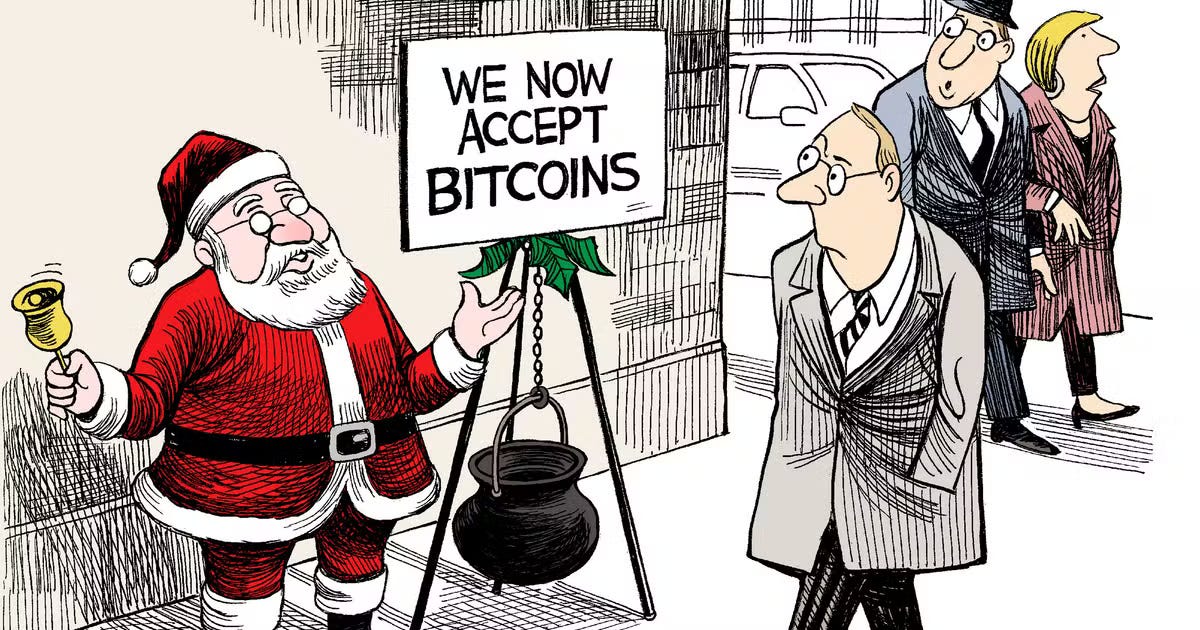Dear Investors,
Welcome to this week’s edition of the Myth of Money. If you would like to keep in closer touch, please reach out on X below.
I’d like to start this week’s newsletter on a personal note. Many of you know that this platform has long served as an extension of my professional journey in the digital assets space. Most recently, that journey culminated in the launch of Moonwalker Capital, a hedge fund specializing in crypto derivatives.
Running a hedge fund in the crypto space is no small feat, particularly from a regulatory standpoint. It demands a complex network of legal counsel, auditors, and administrators spread across multiple jurisdictions. Why? Because the current U.S. regulatory framework treats cryptocurrencies and their derivatives as a gray area, making it challenging to operate within domestic borders. As a result, many funds—ours included—often establish operations in places like the Cayman Islands or the British Virgin Islands, where tax burdens and regulatory hurdles are less restrictive. This isn’t unique to us; it’s a well-trodden path taken by nearly every major player in the space.
This week, however, brought a glimmer of hope for change. I had the unique opportunity to voice my concerns directly to David Sacks, the newly appointed Crypto Czar under President-elect Donald Trump, at Mar-a-Lago Palm Beach.
Sacks, a seasoned venture capitalist and former PayPal executive, has been tasked with shaping U.S. policy on both artificial intelligence and cryptocurrency. His appointment has sparked widespread conversation, particularly among tech and crypto enthusiasts. A pioneer in the digital assets space, Sacks made early Bitcoin investments back in 2013 when it traded at just $130—a testament to his foresight and belief in the transformative potential of digital assets.
The broader crypto community is optimistic that his leadership could pave the way for a more favorable regulatory environment in the U.S. If anyone understands the balance between innovation and oversight, it’s someone like Sacks, with one foot firmly planted in Silicon Valley and the other in the policy arena.
Fed's Third Cut Masks a Hawkish Turn
Markets faced a turbulent week as the Federal Reserve’s hawkish stance on 2025 rate cuts, and persistent inflation pressures, weighed heavily on sentiment. The S&P 500, Nasdaq, and Dow posted weekly losses of 0.5%, 0.9%, and 0.2%, respectively, though Friday saw a modest rebound fueled by better-than-expected inflation data.
Crypto markets mirrored this volatility, with Bitcoin falling over 7% midweek before recovering, while Ethereum and Solana also regained ground. Despite the sell-offs, institutional inflows into Bitcoin and Ethereum spot ETFs signal that confidence in digital assets remains resilient heading into the holidays.
While the Fed announced its third consecutive interest rate cut—lowering rates by 25 basis points to a range of 4.25% to 4.5%—markets were rattled by two key revelations: the reduction of planned 2025 rate cuts from three to two, and an increase in the inflation target from 2.1% to 2.5%.
These adjustments suggest that credit repayment costs will remain elevated longer than expected, discouraging spending and investment, while the higher inflation target reflects the Fed’s ongoing struggle to rein in persistent price pressures. Rising unemployment further complicates the outlook, with signals pointing to a potential pause on further cuts in the upcoming year.
Powell’s Bitcoin Comments Highlight Legal Constraints
Federal Reserve Chair Jerome Powell stated that the Fed is “not allowed to own Bitcoin,” citing restrictions under the Federal Reserve Act. The Act limits the Fed’s asset purchases to government-backed instruments like U.S. Treasury securities, with Section 14 specifically excluding decentralized assets like Bitcoin.
However, past crises show these limitations can be temporarily adjusted. During the COVID-19 pandemic, the Fed used emergency authority under Section 13(3) to establish facilities for purchasing corporate bonds—previously outside its mandate. Backed by $75 billion from the Treasury through the CARES Act, these Special Purpose Vehicles (SPVs) stabilized markets by buying corporate bonds and ETFs, operating with leverage up to 10:1 before being wound down in 2020.
As U.S. debt surpasses 120% of GDP and fiscal pressures grow, similar mechanisms could theoretically allow the Fed to engage with digital assets like Bitcoin. Such a move would require Congressional approval and Treasury support, mirroring the legal and structural adjustments seen during past economic emergencies.
The U.S. government already holds Bitcoin seized in criminal cases, like those tied to Silk Road, which are auctioned off by the U.S. Marshals Service under civil forfeiture laws. Advocates suggest retaining these assets as part of a broader strategy, but establishing a formal Bitcoin reserve would require significant legal and political shifts.
Government Bitcoin Holdings: Global Examples and Emerging Strategies
Governments worldwide are already exploring the role of Bitcoin in their financial strategies.
El Salvador: El Salvador became the first country to adopt Bitcoin as legal tender in 2021 through its Bitcoin Law, requiring businesses to accept it alongside the U.S. dollar. However, under pressure from the International Monetary Fund (IMF), the government recently scaled back its initiatives to secure a $1.4 billion loan package. Bitcoin acceptance is now optional for businesses, tax payments are restricted to U.S. dollars, and the state-run Chivo Wallet is being wound down. Despite these changes, El Salvador continues to hold approximately 6,000 Bitcoin, valued at $572.6 million with Bitcoin trading at $95,438, and maintains its strategy of daily Bitcoin purchases.
Germany: Germany confiscates Bitcoin during criminal investigations under asset forfeiture laws and auctions it off for immediate revenue. In early 2024, authorities sold nearly 50,000 Bitcoin seized from the Movie2K piracy case at an average price of $57,900 per coin, generating €2.64 billion. That stash would be worth over $4.77 billion today—highlighting the potential opportunity cost of not holding it as a reserve asset.
Russia: Facing Western sanctions and seeking to bypass the U.S.-dominated financial system, Russia has explored using Bitcoin for international trade as part of its broader de-dollarization strategy. While details remain limited, this approach underscores Moscow’s interest in leveraging decentralized digital assets to mitigate economic isolation.
China: Despite banning domestic Bitcoin trading in 2021, China has focused on developing its central bank digital currency (CBDC), the Digital Yuan. This state-controlled currency aims to compete with cryptocurrencies like Bitcoin on the global stage while maintaining tight government oversight of financial systems.
United States: The U.S. government seizes Bitcoin during criminal investigations under civil asset forfeiture laws and auctions it through the U.S. Marshals Service. For example, in early 2024, nearly 2,874 Bitcoin linked to Silk Road cases were auctioned for $120 million. While proposals exist for creating a formal Bitcoin reserve, legal and political hurdles make such a move unlikely in the near term.
Michael Saylor recently added a provocative perspective: “The first nation to print their own currency to buy Bitcoin wins.” While the feasibility of such a strategy is debatable, it underscores the geopolitical stakes of cryptocurrency adoption.
This Week By the Numbers 📈
🪙 Cryptocurrency Updates
📈 Macroeconomics and Markets
🏛️ Regulation and Policy
🏦 Corporate and Legal Developments
Meta urged California to stop OpenAI from becoming for-profit
Craig Wright sentenced to 1 year in prison for contempt of court
Top Stories 🗞️
Senate passes government funding bill, averts shutdown
The U.S. Congress passed spending legislation early on Saturday in a down-to-the wire burst of activity that will avert a destabilizing government shutdown ahead of the busy holiday travel season. Congress did not act on Trump's demand to raise the debt ceiling, a politically difficult task, before he takes office on Jan. 20. The federal government spent roughly $6.2 trillion last year and has more than $36 trillion in debt, and Congress will need to act to authorize further borrowing by the middle of next year. The legislation would extend government funding until March 14, provide $100 billion for disaster-hit states and $10 billion for farmers, and extend farm and food aid programs due to expire at the end of the year.
Justin Trudeau looks set to lose power after key ally vows to topple him
Canadian Prime Minister Justin Trudeau on Friday looked set to lose power early next year after a key ally said he would move to bring down the minority Liberal government and trigger an election. New Democratic Party leader Jagmeet Singh, who has been helping keep Trudeau in office, said he would present a formal motion of no-confidence after the House of Commons elected chamber returns from a winter break on Jan. 27. "No matter who is leading the Liberal Party, this government's time is up. We will put forward a clear motion of non-confidence in the next sitting of the House of Commons," said Singh. The leader of the Bloc Quebecois, a larger opposition party, promised to back the motion and said there was no scenario where Trudeau survived. The Conservatives have been calling for an election for months. A few minutes after Singh issued his letter a smiling Trudeau, under growing pressure to quit after the shock resignation of his finance minister this week, presided over a cabinet shuffle.
El Salvador says it will keep buying bitcoin despite IMF warning
El Salvador said on Thursday it would keep buying bitcoin, possibly at an accelerated pace, a day after the government reached a financing agreement with the International Monetary Fund that had said it should limit its exposure to the cryptocurrency. On Wednesday, El Salvador struck a $1.4 billion loan deal with the IMF, as part of which the government of President Nayib Bukele agreed that it would scale back its bitcoin policies. The deal specified that tax payments will only be made in the other official tender, the U.S. dollar. IMF spokesperson Julie Kozack said on Thursday that planned legal reforms in El Salvador would make acceptance of bitcoin by the private sector voluntary.
Trump-Backed World Liberty Financial swaps its cbBTC for WBTC after Sun joins as adviser
World Liberty Financial, backed by the family of U.S. President-elect Donald Trump, on Wednesday exchanged about $10 million worth of Coinbase's (COIN) wrapped bitcoin, cbBTC, for rival WBTC. Wrapped bitcoin is a form of the world's largest cryptocurrency that can be used in decentralized finance (DeFi) on blockchains other than Bitcoin. Coinbase introduced cbBTC in September, and in November said it would delist WBTC, citing its listing standards. That action prompted BiT Global, a custodian involved in WBTC, to sue the crypto exchange to prevent the removal. A court ruled against BiT Global on Wednesday. There's one more link in the chain: Justin Sun, the founder of the Tron blockchain and one of CoinDesk's Most Influential 2024. In its defense, Coinbase cited BiT Global's links to Sun, who has been accused of fraud and market manipulation in the U.S., as an "unacceptable risk." Sun, who denies the accusations, also became an adviser to World Liberty Financial, a position he gained after picking up a $30 million stake in the platform last month in exchange for WLFI tokens.
Moonwalker Capital
Following an incredible run in the markets this quarter, Moonwalker Capital, our digital assets hedge fund, delivers superior returns.
Recent Returns:
September 2024: 12.58%
October 2024: 6.91%
November 2024: 55.83%
December 1-15 - 13.33%
Contact for more info - investors@moonwalker.capital
Thank you for reading this week’s edition of the Myth of Money.🚀
Were you forwarded this email? Subscribe below.
Until next week,
Tatiana Koffman & Katherine MacLellan
About the Author: Tatiana Koffman
Tatiana Koffman is a seasoned investor with over a decade of experience spanning investment banking, derivatives, venture capital, and digital assets. She's widely recognized for her finance and technology expertise, frequently sharing her insights in prominent publications like Forbes, CoinDesk, CNBC, the Economist, Business Insider, and TechCrunch. Koffman leads investment firm Moonwalker Capital, and is the author of Bestselling book the “Myth of Money,” with Wiley Publishing.
About the Author: Katherine MacLellan
Katherine holds an MA (Hons) in Economics and International Relations from the University of St. Andrews, and a JD from Osgoode Hall. She has been thinking and writing about Bitcoin and blockchain technology since 2012.







